The book is described as an intriguing study that explores the neurological basis of optimism, highlighting its evolutionary advantages. The reviewer finds the examination of the optimism bias both enlightening and well-researched.
The Times' review of The Optimism Bias commends the book for its intriguing exploration of the neurological basis of optimism. The reviewer finds the examination of the optimism bias enlightening, particularly how it ties into our evolutionary history. The book is praised for its well-researched and accessible presentation of complex ideas, making it appealing to both scientists and general readers. The reviewer appreciates how the book illustrates the advantages of optimism, such as reduced stress and enhanced well-being. Overall, the book is seen as a valuable and thought-provoking read that offers a unique perspective on human behavior.
Quick quotes
We are all hard-wired with 'the optimism bias'.
Optimism enhances the probability of survival and reduces damaging stress.
The book offers a unique perspective on human behavior and cognition.
